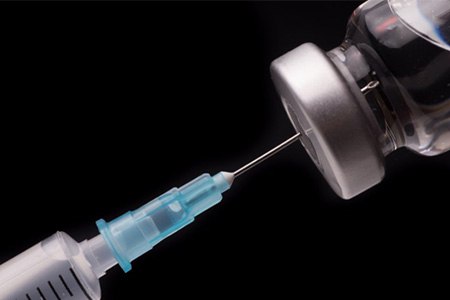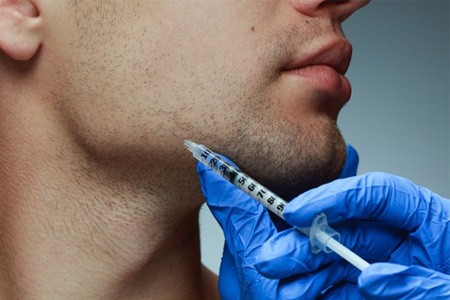TMJ Therapy – Fort Worth, TX
Providing You With Lasting TMJ Relief

Do you notice a clicking or popping jaw when you open your mouth? This, among a variety of other symptoms, could be the result of TMD, or temporomandibular joint disorder. These are the two joints that connect your jaw to your skull, allowing you to easily chew your food, yawn, and speak. If they aren’t operating as they’re supposed to, it can cause you pain and discomfort that impacts your everyday life. Fortunately, our team at Drennan Family Dentistry can help with TMJ therapy in Fort Worth, TX.
Why Choose Drennan Family Dentistry
for TMJ Therapy?
- Customized Oral Appliances
- Pain-Relieving TMJ Therapy
- Experienced Dental Staff
Diagnosis & Treatment

TMJ disorder can cause a variety of symptoms that can cause daily discomfort, including:
- Pain and jaw tenderness
- Aching around the ear
- Difficulty chewing
- Locking jaw
- Clicking and popping sounds while opening your mouth
When you let us know, we can examine your jawbone structure to determine what the underlying problem is. If it’s caused by TMJ disorder, we can outline a customized treatment plan to help ease your pain.
Equilibration/ Occlusal Adjustments

Our equilibration/occlusal adjustment procedure allows us to make minor changes to your teeth so they come together in a more functional and comfortable way. Severe misalignment can put additional pressure and strain on certain areas of your jaw, causing pain. Our team will take impressions of your teeth to find out the location of these areas and gently buff them away so they don’t continue to cause you pain.
Occlusal Splints

TMJ can cause limited function of your jawbone due to issues with misalignment. In these cases, it’s not uncommon for patients to experience teeth grinding while sleeping. If this is the root cause of your TMD discomfort, then we may suggest occlusal splints. This is a customized mouthpiece made to shift your jaw into corrected alignment while you’re sleeping. Over time, your jaw will naturally assume this position, minimizing discomfort and preventing grinding.
BOTOX® for TMJ Treatment

Those who are suffering from TMJ disorder usually struggle with discomfort and aching in and around their jaw and the muscle joints associated with them. If left unchecked for too long, this situation can end up negatively impacting a person’s daily life and overall well-being, as certain everyday tasks will become more difficult to do, such as talking, eating, and smiling. Fortunately, our team at Drennan Family Dentistry can help relieve and address TMJ issues with BOTOX®! These injections are designed to help relax and loosen muscle tension, which can help allow the jaw joints time for healing.
What is BOTOX®?

This medication is a controlled form of botulinum toxin —a diluted bacteria that has been utilized for many years for treating muscle spasms and discomfort. Whenever injected into the painful or damaged muscle, BOTOX® can keep any unconscious movements from happening, allowing the chance for proper rejuvenation.
Before moving forward with the treatment, you’ll need to visit our team for a consultation so that we can understand your situation and determine the proper amount of injections needed. We’ll look over your history with TMJ disorder and your symptoms, and develop a custom plan to treat the problem. The process should only take 20-30 minutes for the injections to be performed, and you can typically see results in around 5-10 days and last about three to four months depending on the patient’s reaction to the solution.
Are You a Good Candidate for BOTOX® for TMJ Treatment?

Firstly, those who are pregnant or have particular neuromuscular diseases might not be eligible for BOTOX®. In most cases, however, BOTOX® can be effective at helping patients who are struggling with discomfort in their temporomandibular joint (TMJ). By injecting the medication in the proper locations of your facial muscles, we can help alleviate any tension you might be experiencing. BOTOX® can even help minimize headaches and pain due to chronic grinding and clenching of your teeth. Generally speaking, BOTOX for TMJ treatments might be best for those experiencing symptoms such as:
- Trouble or difficulty eating or chewing
- Limited mobility of the jaw, including lockjaw
- Jaw pain or sensitivity
- Headaches and/or earaches
How Can BOTOX® Treat TMJ Disorder?

BOTOX can generally help significantly reduce discomfort in a patient’s oral movements for several months. Additionally, according to a recent study, this method of TMJ treatment can also alleviate or improve about 90% of a person’s symptoms. Not only will you be able to reduce soreness and aching around the jaw joint muscles or headaches, but you’ll also get to promote much better rest, which can aid in the healing process.
TMJ Treatment FAQs
How Long Does It Take for an Occlusal Splint to Work?
You’ll normally need to wear your occlusal splint to bed every night. You’ll quickly notice a reduction in your symptoms, and many patients notice a significant improvement after six weeks. However, full relief usually takes longer as the TMJs and the muscles around them need time to adjust to their changed positions.
On average, you can expect to need to wear your occlusal splint for between three and six months. The exact amount of time is different for every patient; your own recovery could be longer or shorter based on your circumstances.
How Long Does Occlusal Equilibration Take for TMJ?
The number of appointments required for occlusal equilibration depends on what changes need to be made. Most of the time it only takes about one to three short visits, during which your dentist will make the necessary adjustments to your smile so that the forces of your bite are distributed correctly.
Once your equilibration is complete, it will take some time for your TMJ symptoms to fade. Generally speaking, relief comes relatively quickly, but the exact amount of time varies from case to case.
Does Occlusal Equilibration for TMJ Hurt?
Some patients are nervous about discomfort during the occlusal equilibration process, but rest assured that our team will do everything they can to keep you comfortable during your treatment. Local anesthetic is sometimes used to numb the mouth, but it isn’t always necessary; it depends on the kind of changes being made.
In some cases, you might notice that your jaw is sore for a few days following the occlusal equilibration process. The discomfort should only be mild, and it will go away on its own after a while.
Is TMJ Treatment Covered by Dental Insurance?
Unfortunately, the answer to this question isn’t set in stone. Many insurance companies do not offer TMJ coverage unless it’s mandated by the state. Other policies do include such coverage but only for specific kinds of treatments; for example, some insurance plans will only pay for surgical procedures.
It should also be noted that since the TMJ is a joint, it’s not technically directly related to dentistry. However, there are several TMJ treatments (like occlusal splints) that only dental professionals can offer. As such, TMJ therapy can be covered under medical or dental insurance depending on the circumstances.
In short, it’s best to call your insurance provider to ask about any coverage they might provide for TMJ therapy. If you’re still not sure that you understand the specifics of your plan, one of our team members can review it with you.






